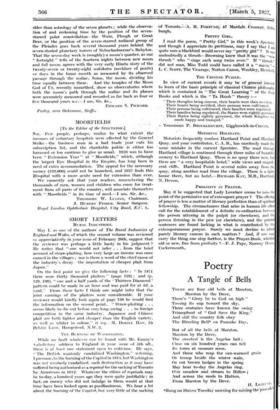SHORT LETTERS RURAL INDUSTRIES.
May I, as one of the authors of The Rural Industries of England and Wales, of which the second volume was reviewed so appreciatively in your issue of February 26th, suggest that the reviewer was perhaps a little hasty in his judgment ? He writes that " one would not infer . . . from the brief account of straw-plaiting, how very large an income was once earned in the villages ; nor is there a word of the chief cause of the industry's decay—the importation of cheaper plait from Japan."
On the first point we give the following facts : " In 1871 there were thirty thousand plaiters " (page 119) ; and (p. 129, 130), " one and a half yards of the ' Thirteen Diamond' pattern could he made in an hour and was paid for at 3d. a yard." From these facts I think one might infer that the joint earnings of the plaiters were considerable. If your reviewer would kindly look again at page 138 he would find the information on the second point. " Straw-plaiting . . . seems likely to die out before very long, owing . . . to foreign competition in the same industry. Japanese and Chinese 'plait arc both lighter and cheaper than the English variety, as well as whiter in colour," el seq.---M. DORIEL II.Av, 24 Belize Lane, Hampstead, N.W. 3.
THE BURNING OF WASHINGTON.
While no fault whatever can be found with Mr. Essary's valedictory address to England in your issue of 5th ult., there is at least one statement open to criticism. He says,
The British wantonly vandalized Washington," referring, I presume, to the burning of the Capitol in 1814, but Washington was not wantonly vandalized, such destruction as it may have suffered being authorized as a reprisal for the sacking of Toronto 'by Americans in 1812. Whatever the ethics of reprisals may be to-day, a hundred years ago they were quite justifiable ; in Tact, an enemy who did not indulge in them would at that 4ime have been looked upon as pusillanimous. We hear a lot about the burning of the Capitol, but very little of the sacking - of Vorontb."-------A. B. Fowitrwei- 4*IMaidaIe Crescent, Rdie, burgh.
PRETTY Gnu..
I read the poem, " Pretty Girl," in this week's Spectator, and though I appreciate its prettiness, may I say that I ase quite sure a blackbird would never say "pretty girl" ? It was undoubtedly a thrush—Browning knew that it was the "wise
thrush " who " sings each song twice over." If " thrush" did not scan, Miss Todd could have called it a "
L. C. Scorn,-The Vicarage, Norton Canon, Weobley, Hereford,
THE CHINESE PUZZLE.
In view of current events it may be of general interest to learn of the basic 'principle of Classical Chinese Philosophy which is contained in " The Great Learning " of the Four Books and which is the " Ta Hsioh " theory :—
" Their thoughts being sincere, their hearts were then rectified. Their hearts being rectified, their persons were cultivated. Their persons being cultivated, their families were regulated. Their families being regulated, the States were rightly governed. Their States being rightly governed, the whole Kingdom wa
MOTORING HOLIDAYS.
Motorists frequently confuse Hartland Point and Hartland Quay, and your contributor, C. A. R., has carelessly made tlx ' same mistake in the current Spectator. The road through Hartland village is continued through three miles of beautiful scenery-to Hartland Quay. There is no quay there now, but there are " a very hospitable hotel," wide views and magnifi- cent cliffs. Hartland Point is several miles away from tlx quay, along another road from the village. There is a light- house there, but no hotel.—RICHARD KAY, M.B., Hartland, N. Devon.
PROLIXITY IN PRAYER.
May it be suggested that Lady Lovelace seems to miss the point of the permissive use of extempore prayer ? The offering of prayer is less a matter of literary perfection than of spiritual fellowship. The circumstances that arise in human life often call for the establishment of a definite co-ordination between the person uttering in the pulpit (or elsewhere), and the person listening in the pew (or elsewhere), and the print sentences are found lacking in what is contributed by tl extemporaneous prayer. Surely we must decline to adm purely literary canons in such matters ? And, if one aim carry the thing one step farther, is the Prayer-Book, whet) old or new, free from prolixity ?—F. J. Pape, Norway How Coekermouth.
made happy and tranquil." . .
—THEODORE P.- BROCKLEHURST, Giggleswick-in-Craven.






























































 Previous page
Previous page